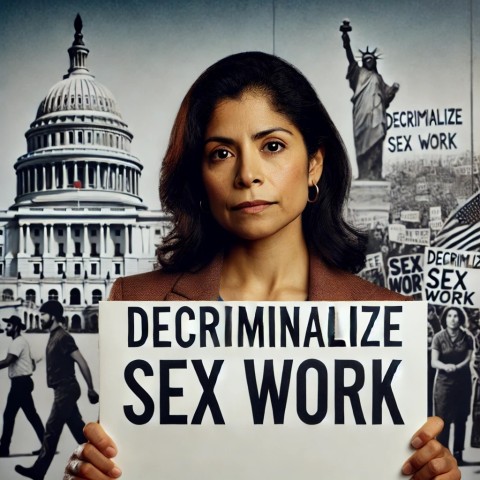As the 2024 election season unfolds, sex workers and their advocates are turning their attention to Vice President Kamala Harris, laying out what they believe needs to change if she becomes the next President. In an open letter, SWOP Behind Bars, a branch of the Sex Workers Outreach Project-USA (SWOP-USA), has detailed their concerns and recommendations, hoping to influence Harris’s policies. This comes at a time when Harris’s platform is perceived by some as malleable, with many progressive groups trying to shape her stance on critical issues.
Harris's history with sex work-related legislation, particularly her support of SESTA-FOSTA, has placed her under scrutiny. SESTA-FOSTA, a set of laws passed in 2018 under the Trump administration, was intended to combat sex trafficking by amending Section 230 of the Communications Decency Act. This amendment allows internet platforms to be held liable for hosting content related to sexual services, leading to the shutdown of sites like Backpage and Craigslist Personals, which many sex workers had used to safely advertise and screen clients. The removal of these platforms has pushed sex workers into more dangerous and vulnerable situations, often forcing them to work on the streets or under the control of exploitative third parties.
The letter from SWOP Behind Bars underscores the devastating impact SESTA-FOSTA has had on the lives of sex workers. Before these laws, working online provided sex workers with a degree of safety and independence, allowing them to screen clients, share information, and avoid the dangers of street work. The loss of these platforms has increased the risks sex workers face, leaving them more exposed to violence and exploitation. As one sex worker quoted in a 2020 report by independent researchers Danielle Blunt and Ariel Wolf noted, “Everything I know about being safe in sex work is because I was able to speak to other sex workers online.” The letter calls on Harris to recognize these unintended consequences and to support the full decriminalization of consensual adult sex work, distinguishing it clearly from trafficking.
The letter also references Harris's time as California’s Attorney General, highlighting a particularly troubling case involving the Oakland Police Department. In 2016, a teenage sex worker using the pseudonym Celeste Guap came forward with allegations that dozens of Oakland police officers had sexually exploited her, some while she was still a minor. Despite repeated appeals from her attorney for the Attorney General's office to intervene, there was no response. SWOP Behind Bars points to this case as a significant failure in accountability and transparency, urging Harris to commit to stronger oversight of law enforcement and to take decisive action against abuses of power.
SWOP Behind Bars also advocates for a range of measures aimed at improving the working conditions and legal protections for sex workers. This includes ensuring access to non-judgmental and inclusive healthcare, mental health services, and social support systems, particularly for transgender sex workers who face additional layers of discrimination and marginalization. The organization also calls for broader economic justice, recognizing that many people enter the sex work industry due to systemic inequalities and a lack of viable economic opportunities. Addressing these root causes, they argue, is essential for any meaningful reform.
Another key issue raised in the letter is the need to combat the pervasive stigma and harmful narratives surrounding sex work. The letter argues that dehumanizing language and policies not only perpetuate discrimination but also increase the likelihood of violence against sex workers. By failing to acknowledge sex work as legitimate labor, society pushes these workers further into the shadows, where they are more vulnerable to exploitation and abuse. The letter urges Harris to use her platform to challenge these harmful narratives and to promote respect and dignity for all workers, including those in the sex industry.
The letter’s call for decriminalization is a significant shift from Harris's earlier stance. In 2008, as the district attorney of San Francisco, Harris dismissed the idea of decriminalization, arguing that it would open the city’s doors to “pimps and prostitutes.” However, her more recent statements suggest a possible evolution in her thinking. In a 2019 interview, Harris expressed support for considering the decriminalization of consensual sex work, provided no one is being harmed or exploited. This shift has given some advocates hope that a Harris administration might be open to reforming harmful laws like SESTA-FOSTA and moving towards full decriminalization.
SWOP Behind Bars also highlights the importance of improving sex workers' relationships with law enforcement, healthcare providers, and social services. The stigma that sex workers face often extends into these areas, making it difficult for them to access the support they need without fear of judgment or discrimination. The letter calls for better training for law enforcement officers to ensure they treat sex workers with respect and create safe avenues for reporting abuse. It also advocates for policies that protect sex workers from violence and exploitation, holding abusers accountable for their actions.
In addition to these specific policy recommendations, SWOP Behind Bars emphasizes the need for economic justice and labor rights. Many sex workers are driven to the industry by a lack of other economic opportunities, and their work is often excluded from traditional labor protections. The letter calls for recognizing sex work as legitimate labor, including the right to organize, unionize, and work under fair conditions. While many sex workers are classified as independent contractors and are ineligible to formally unionize, there are precedents for successful organizing within the industry. The unionization of workers at the Lusty Lady in San Francisco in the 1990s, for example, demonstrated the potential for collective bargaining in the sex work industry, even though it remains a challenging and often resisted effort.
Finally, the letter addresses the broader cultural issues surrounding sex work, calling on Harris to take a stand against whorephobia and the harmful narratives that contribute to the stigmatization of sex workers. The use of dehumanizing language and policies increases the risk of discrimination and violence, making it all the more important for any administration that claims to care about vulnerable workers to include sex workers in that category. The letter reminds Harris that millions of sex workers and online content creators are watching her closely as the election approaches, and they need to know that their safety, dignity, and rights will be respected.
In conclusion, the open letter from SWOP Behind Bars is not just a critique of past policies but a comprehensive call to action for a Harris administration to make meaningful changes in the lives of sex workers. By addressing the issues raised in the letter decriminalization, accountability in law enforcement, economic justice, and the fight against stigma Harris has the opportunity to reshape the narrative around sex work and take steps towards a more just and inclusive society. As Election Day draws nearer, the voices of sex workers and their advocates will continue to push for their inclusion in the broader conversation about workers' rights and social justice.













